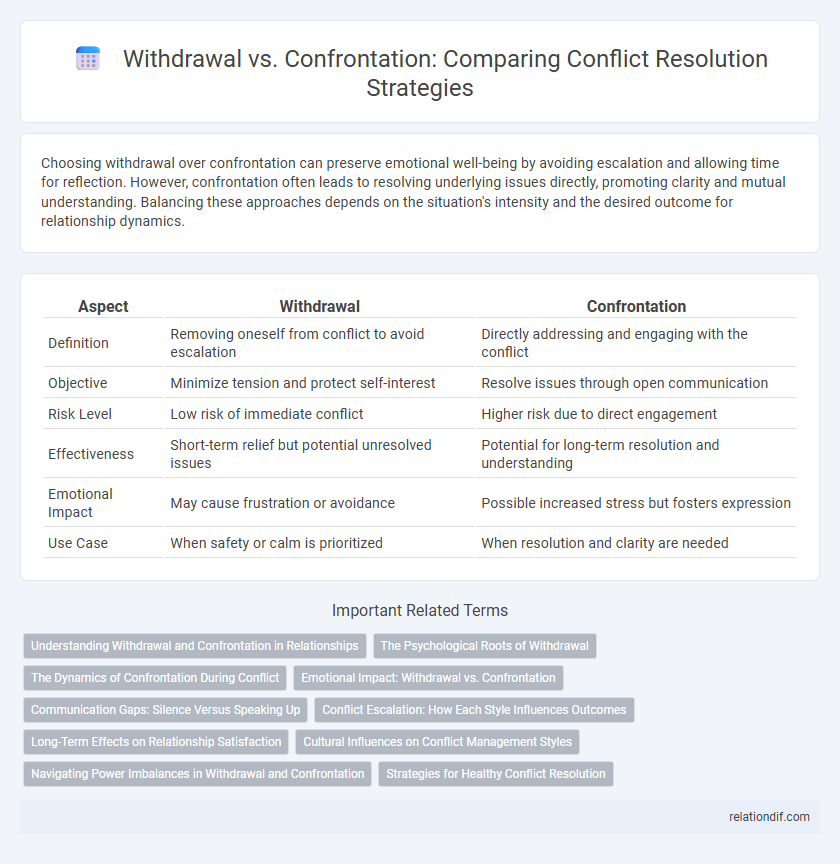Choosing withdrawal over confrontation can preserve emotional well-being by avoiding escalation and allowing time for reflection. However, confrontation often leads to resolving underlying issues directly, promoting clarity and mutual understanding. Balancing these approaches depends on the situation's intensity and the desired outcome for relationship dynamics.
Table of Comparison
| Aspect | Withdrawal | Confrontation |
|---|---|---|
| Definition | Removing oneself from conflict to avoid escalation | Directly addressing and engaging with the conflict |
| Objective | Minimize tension and protect self-interest | Resolve issues through open communication |
| Risk Level | Low risk of immediate conflict | Higher risk due to direct engagement |
| Effectiveness | Short-term relief but potential unresolved issues | Potential for long-term resolution and understanding |
| Emotional Impact | May cause frustration or avoidance | Possible increased stress but fosters expression |
| Use Case | When safety or calm is prioritized | When resolution and clarity are needed |
Understanding Withdrawal and Confrontation in Relationships
Withdrawal in relationships often signals a desire to avoid escalating conflict by retreating emotionally or physically, which can create distance and unresolved tension. Confrontation, while challenging, opens channels for honest communication and problem-solving, allowing partners to address issues directly and build mutual understanding. Recognizing when to withdraw to cool down versus when to confront for clarity is crucial for maintaining healthy and balanced relationships.
The Psychological Roots of Withdrawal
Withdrawal in conflict situations often stems from deep psychological roots such as fear of rejection, low self-esteem, and past trauma, which drive individuals to avoid confrontation as a self-protective mechanism. This behavior activates the brain's fight-or-flight response, where choosing withdrawal can minimize immediate emotional stress but may hinder conflict resolution and personal growth. Understanding these underlying psychological factors is essential for developing strategies that encourage constructive engagement rather than avoidance in challenging interpersonal dynamics.
The Dynamics of Confrontation During Conflict
Confrontation in conflict involves direct engagement with opposing parties, intensifying emotional and psychological stakes as individuals assert their positions. The dynamics of confrontation are influenced by communication patterns, power imbalances, and the perceived legitimacy of claims, often escalating tensions but also enabling resolution through negotiation. Withdrawal, by contrast, may reduce immediate conflict but risks unresolved issues and potential power shifts, altering the overall conflict trajectory.
Emotional Impact: Withdrawal vs. Confrontation
Withdrawal often leads to feelings of isolation, frustration, and unresolved tension, intensifying emotional distress over time. Confrontation, while initially causing anxiety or discomfort, can facilitate emotional release and promote understanding, reducing long-term psychological strain. The emotional impact varies based on individual coping mechanisms and the context of the conflict.
Communication Gaps: Silence Versus Speaking Up
Communication gaps in conflict often manifest as withdrawal through silence or confrontation via speaking up, each impacting resolution differently. Silence can create misunderstandings and escalate tension by leaving issues unaddressed, while speaking up encourages transparency and facilitates problem-solving by making concerns explicit. Effective conflict management requires balancing these approaches to bridge communication gaps and foster mutual understanding.
Conflict Escalation: How Each Style Influences Outcomes
Withdrawal in conflict situations often prevents immediate escalation by avoiding direct engagement, but it may lead to unresolved issues that resurface later with increased intensity. Confrontation tends to escalate conflict rapidly but can facilitate quicker resolution by addressing underlying problems head-on. Effective conflict management depends on balancing withdrawal and confrontation to minimize long-term damage and promote constructive outcomes.
Long-Term Effects on Relationship Satisfaction
Withdrawal during conflict often leads to unresolved issues, fostering resentment and decreased relationship satisfaction over time. Confrontation, when managed constructively, promotes open communication and problem-solving, enhancing mutual understanding and long-term relationship stability. Persistent avoidance can erode trust, while effective confrontation strengthens relational bonds and emotional intimacy.
Cultural Influences on Conflict Management Styles
Cultural values significantly shape whether individuals adopt withdrawal or confrontation during conflicts; collectivist societies often favor withdrawal to preserve group harmony, while individualistic cultures lean toward direct confrontation to assert personal rights. High-context cultures utilize indirect communication, reducing overt conflicts through subtle withdrawal or avoidance, contrasting with low-context cultures that emphasize explicit expression and confrontation. Understanding these cultural influences aids global organizations in tailoring conflict resolution strategies that respect diverse communication norms and promote effective collaboration.
Navigating Power Imbalances in Withdrawal and Confrontation
Navigating power imbalances during conflict requires strategic approaches to withdrawal and confrontation, as withdrawal can serve as a self-preservation tool when facing disproportionate force, while confrontation may be necessary to assert boundaries and challenge oppressive dynamics. Understanding the balance between retreating to regroup and standing firm to demand respect influences outcomes in situations with unequal power. Effective conflict resolution hinges on recognizing when to disengage to protect oneself and when to engage to transform power relations.
Strategies for Healthy Conflict Resolution
Effective conflict resolution involves choosing between withdrawal and confrontation based on the situation's emotional intensity and stakes. Withdrawal can serve as a temporary strategy to de-escalate tension, allowing individuals time to reflect and cool down. Confrontation, when approached with active listening and empathy, facilitates openness and mutual understanding, promoting long-term relationship health.
withdrawal vs confrontation Infographic

 relationdif.com
relationdif.com